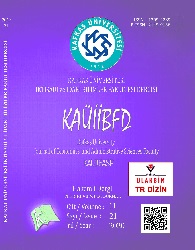MAX WEBER’DE PATRİMONYALİZM VE BÜROKRASİ KAVRAMLARI: ANTİK VE ÇİN İMPARATORLUĞU ÜZERİNE ANALİZLER
PATRIMONIALISM AND BUREAUCRACY CONCEPTS IN MAX WEBER: ANALYSIS ON ANTIQUE AND CHINESE EMPIRE
Author(s): Kadir Caner DoğanSubject(s): Political Philosophy, Social Philosophy, Public Administration, Political history, Government/Political systems
Published by: Kafkas Üniversitesi Sağlık, Kültür ve Spor Daire Başkanlığı Dijital Baskı Merkezi
Keywords: Weber; Patrimonialism; Bureaucracy; China;
Summary/Abstract: Chinese civilization is an ancient society with a historical background of 3,000 years in the political sense. Confucianism was seen as the political and social philosophy of the state in China, which was ruled by different dynasties starting from the ancient period and during the imperial period. The bureaucracy in ancient and imperial China was also influenced by these formations. As a matter of fact, Western sociologist Max Weber describes the bureaucracy in China as patrimonial. In this study, it is mainly aimed to make analyzes on Chinese bureaucracy based on Weber's theses of capitalism, modernity and Eastern perception. Weber's point of view on the subject, the basics of his sociology and how he adapted the concept of bureaucracy to China within the framework of his basic scientific methodology. In this respect, the basics of bureaucracy in China and Weber's views and analyzes on this realized bureaucracy are the focus of the study.
Journal: Kafkas Üniversitesi İktisadi ve İdari Bilimler Fakültesi Dergisi
- Issue Year: 11/2020
- Issue No: 21
- Page Range: 410-433
- Page Count: 24
- Language: Turkish

